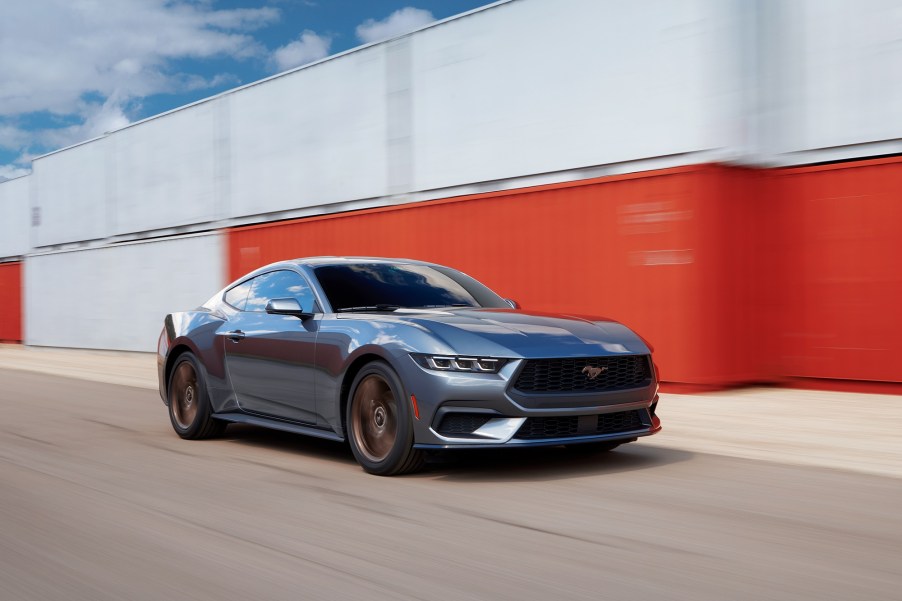
2024 Mustang: What Were the Designers Thinking?
With the release of the 2024 Mustang, you can see that, in spite of it using essentially the same architecture as the current version, there are huge differences in technology, interiors, and overall styling. So it is appropriate to compare the two and see what Ford designers thought should change design-wise, and why. The Mustang is a somewhat difficult car to do a new design for because there are so many previous generations that are iconic. And there are a lot of Mustang cues and features the company wants to be carried over. Yet, it still needs to be fresh with all of that baggage other designs don’t carry.
Did Ford designers change enough or too much on the 2024 Mustang?

Overall, we’re talking about changes from the beltline on down because, as we said, it is the same architecture. It’s the same profile. Overhangs and sheet metal may have changed, but above the beltline is a carryover. With that said, every bit of sheet metal is all new.
The first two things that pop out are how designers wanted to simplify the form and wanted to take some of the pucker out of it. What does that mean? It means the fascia frown, and design lines that taper down on the current Mustang have been stiffened up. So, while the overall design is cleaner, it is also visually less flabby, if you will.
The 2024 Mustang flattens and cleans up the previous design

In the front, the grille that tapers down has almost been flipped top to bottom. It has also been opened up for more air intake, but also to visually look more aggressive. And the separate parking lights have given way to integration in the three-section LED headlights. It mimics the trend of slimmer headlights popular today.
The hood and how it leads into the base of the windshield have also been flattened out. And the sharp break of the upper fender bulges has been softened, too. However, the lower valance and air dam are very similar to current models, carrying over from the current generation. There will be different fascias depending on trims.
It’s the same profile, but it’s not the same Mustang

From the side, the beltline is dipping down more through the door and then extends higher towards the rear to emphasize the aggressive fender shoulders. Both the sharp upper break and rocker design lines have been deemphasized. And the surface connecting the two top to bottom has much less crown. Again, this takes out some of the flabbiness of the current model. It is cleaner and crisper.
Yet, the shoulders have a bit more crown to emphasize their muscularity. And while the front overhang looks to be the same, the rear is noticeably shorter. That helps to visually lighten the rear from the side, to get away from the wet diapers on a baby look.

Another big improvement, though more subtle, is that the rear wheel openings have been opened up slightly. It has been an ongoing problem, at least as we see it, with many GM products, including the current Camaro. They need to open up those wheel openings for a more aggressive look. Another subtle nod to eliminating droop is the side-marker lights are tipped vertically, while the current Mustang has them placed horizontally.
Why did Ford slim up the rear?

At the rear, the black panel between the taillights of the previous generation is now body color, to blend it into the form better. The taillights have been slimmed up as have the headlights. That allows the area around the license plate to retain similar proportions, while the lower valance and splitter are taller. This also visually lightens up the rear.

Overall, the upper rear end tried to eliminate the fussiness of the current Mustang, while the lower section comes up to give the rear some visual foundation. And maybe the biggest change is how the decklid tapers back beyond the rear sheet metal itself. Again, this helps to downplay all of the surface changes and fussiness of the current Mustang.
Overall the new Mustang is visually lighter and expresses a simpler, cleaner design. Some critics say it looks like the current Camaro. But what makes up a design are its surfaces, proportions, and details. Taken together, there is no comparison between the two pony cars. Now, Ford needs to start cranking new Mustangs out without hiccups as has been prone to occur with previous all-new models like the Explorer, Bronco, and Mach-E. We know that Ford can do it, after all, it has been for over 100 years.



